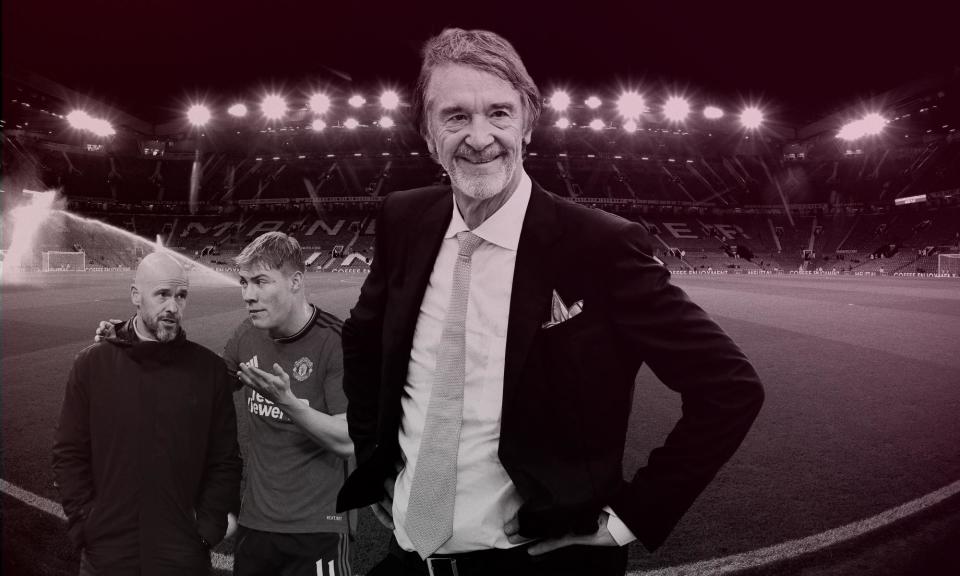From Ten Hag’s future to a leaking roof: Ratcliffe’s Manchester United in-tray

The manager’s future
Erik ten Hag’s team are treading water at precisely the wrong moment: as Sir Jim Ratcliffe takes charge of Manchester United’s sporting department before making sweeping changes in the posts that will directly affect the manager. Richard Arnold has left despite officially staying until the end of the year and into his role may come Jean-Claude Blanc, the CEO of Ratcliffe’s Ineos Sport, as the man Ten Hag reports to. Ten Hag’s line manager may change too, as Ratcliffe considers whether a new football director is required, a position held by John Murtough. Ten Hag may have a first clue of his status in Ratcliffe’s new empire if he is sounded out for his view of a prime factor in his ability to coach and manage the side to success: United’s transfer policy. This leads us to Murtough …
Will Murtough survive?
The football director has no plans to depart but whether he remains in situ may be a matter for Ratcliffe. Some inside the club believe Murtough will either be moved sideways or follow Arnold through the exit door. Ratcliffe might have signalled his assessment of him when, during a March tour of the club, he questioned the signing of a 30-year-old Casemiro on a four‑year deal worth about £350,000 a week. Murtough, whose football department has a transfer veto, and Ten Hag, who has the same, were responsible for the Brazilian’s signing. The word is that Murtough, present when Ratcliffe raised this, was hardly impressed. Particularly as Nice, the French club owned by Ratcliffe, recruited Aaron Ramsey, Kasper Schmeichel and Ross Barkley as part of the nine signings in the same summer Casemiro joined United. Schmeichel was 35 and signed a three-year contract in a £1m transfer from Leicester; Ramsey, then 31, and Barkley, then 28, came on frees and were given one-year deals. All three players left Nice this summer. Newcastle’s sporting director, Dan Ashworth, and Paul Mitchell, Monaco’s sporting director until March, are among those mentioned in dispatches as a potential Murtough replacement.
Related: Sir Jim Ratcliffe completes deal to buy Manchester United minority stake
Can any CEO make United a best-in-class elite club again?
Blanc, who has an MBA from Harvard, is billed as the “Lionel Messi of business” by Nice’s chief executive, Fabrice Bocquet. At 60 years old Blanc has been the Juventus CEO and president, CEO at Paris Saint‑Germain and French Tennis, and the executive overseeing the Tour de France. But once he or whoever becomes Arnold’s successor is in place, it will dawn rapidly that United are a one-off hydra-headed beast of a club which is treacherously difficult to control. And there is this, too: across town Manchester City have accrued six championships since United’s last in 2013 and boast a commercial operation that leaves Ratcliffe’s new concern light years behind.
Old Trafford (and the training ground)
To find an apt shorthand for the lurching ship that is United, end the search at the roof of their stadium where on Manchester’s (many) wet days rain leaks through. Old Trafford remains a storied venue but as it continues to crumble the tale of disrepair has become a central narrative in its recent history. As Premier League titles have become scarce (zero in a decade) the tale of neglect of a ground that dates to 1910 is emblematic of the Glazers’ quasi‑absentee proprietorship. Ratcliffe will invest $300m (£237m) into infrastructure but this is small beer when considering the multibillion-pound facelift or new venue required. There is also the cramped Carrington base: as on Sir Matt Busby Way, the footprint is large at the training ground but the configuration and facilities are ageing – badly.
Communications
The Glazers treat a microphone or TV camera as United fans do Liverpool or Manchester City: as a fierce enemy. No family member has given a press conference or interview during their 18-year tenure. Ratcliffe has arrived on a ticket of, partly, being the local lad made good (Failsworth, where he was born, is next to Newton Heath, United’s birthplace) so if he proves as silent as the Americans then this will be: a) poor PR; and b) just plain poor. Football fans can be classed as the most loyal citizens of any society but even the faith of United enthusiasts has been stretched by the cold relationship created by the Glazers’ stance regarding communication. A tap-in, then, for Ratcliffe is to remedy this by opening and maintaining a regular line into supporters.
Ensuring a working relationship with the Glazers
For paying an overpriced £1.3bn for his 25% Ratcliffe obtains a major element of control but still the Glazers remain majority owners. The 71-year-old oversees football policy but these do not exist in a vacuum given that the commercial side affects this and vice versa. Ratcliffe accepts Manchester United have an impressive revenue-based model that makes the club akin to a cash machine but he is not enamoured of how the money generated is invested – primarily in the squad. What happens then, for example, if Ten Hag wants a new midfield ace, Ratcliffe agrees but the Glazers cite a downturn in income and thus seek to block the signing?

